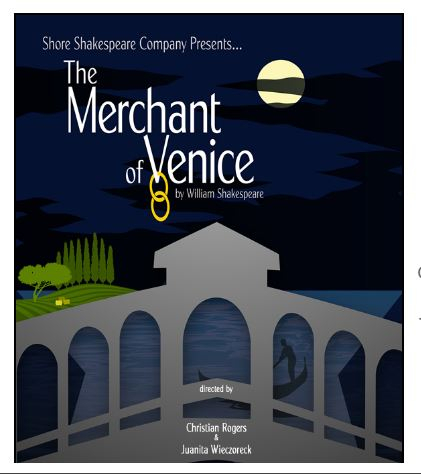
The cast of Shore Shakespeare’s 2019 production of “The Merchant of Venice”
The Bard is alive and well on the Eastern Shore of Maryland! Now in its 8th year, Shore Shakespeare has produced one or more plays each summer, all performed outdoors in the traditional Elizabethan style with elaborate costumes and clever portable sets. This year the company has chosen one of Shakespeare’s most well-known and perhaps most controversial plays – The Merchant of Venice. The tour started with one weekend in Cambridge, followed by a weekend in Oxford, and now Shore Shakespeare is coming to Centreville for its final performances of the 2019 season.
The Centreville performances will begin at 6:00 pm on Friday and Saturday, Sept. 13 and 14 at the Wharf at 212 Watson Road. All performances are free and open to the public. So pack a picnic, grab a blanket and chair and come see Shakespeare under the stars just like in the Elizabethan era.

Program cover for Shore Shakespeare 2019 production of “The Merchant of Venice”
Directed by Christian Rogers and Juanita Wieczoreck, The Merchant of Venice tells the story of two sets of star-crossed lovers in 16th century Venice, Italy. Bassanio, a young fortune-hunter, seeks a loan from his friend Antonio, the merchant of the title, so he can compete for the hand of Portia, a beautiful heiress. Antonio is short of funds and, against his better judgment, borrows the money from Shylock, a notorious Jewish moneylender. In the meantime, the other set of lovers, Jessica and Lorenzo, have eloped, bringing down on them the wrath of Jessica’s father, Shylock. Her father is especially upset because Jessica has married out of her faith — Lorenzo is a Christian. Shylock is devastated but no one seems to have any sympathy or understanding for him. Unfortunately, this happens just when Antonio’s trading ships meet with disaster at sea and Antonio is no longer able to repay Bassanio’s debt to Shylock — which has now come due.
Here is where it becomes tricky — and controversial. This is the famous “pound of flesh” which Antonio agreed to pay if the loan was not repaid in full on time. No one ever thought it would come to that. But Shylock, still angry and stung by his daughter’s defection, insists on getting his “pound of flesh” and a trial is set. Through various schemes and tricks, including multiple disguises, Antonio’s life is saved.
The Merchant of Venice uses many of Shakespeare’s favorite dramatic devices including characters in disguise, often as the opposite sex. Here Portia and her companion Nerissa disguise themselves as legal scholars–male, of course–and successfully argue Antonio’s case in court. Neither Bassanio nor Antonio nor the Duke who is the judge recognize them, thus not-so-subtly pointing out that, in this case, the women are the smart ones. But it is all done good-naturedly and the lovers presumably live happily ever after.
The cast of Merchant features company co-founders Avra Sullivan as Portia and Christian Rogers as Antonio. Shylock is played by Brian McGunigle with Max Hagan as Bassiano and Howard Mesick as Gratiano. Also in the cast are Jackie Royer, Li Wojehowski, Troy Strootman, Paul Briggs, Samantha Davis, Josh Hansen, John Feldman, Deanna van Skiver, and Jane and John Tereby. The production is co-directed by Christian Rogers and Juanita Wieczoreck, with costume design by Barbi Bedell and tech support by Hope Dorman.

Li Wojehowski as Jessica, Brian McGunigle as Shylock in Shore Shakespeare 2019 production of “The Merchant of Venice”

Troy Strootman as Lorenzo, Howard Mesick as Gratiano in Shore Shakespeare 2019 production of “The Merchant of Venice”
The Merchant of Venice has been controversial for centuries – though not always for the same reasons. At the time, anti-semitism was common, accepted, and usually ensconced in law. The city-state of Venice was much more tolerant of diversity–including religious diversity– than most other places in Europe. That comparative legal and social leniency, however, did not mean that there was no prejudice against those of the Jewish faith. There definitely was–in Venice, in Shakespeare’s England, and in Europe generally. Shakespeare basically uses that reality, the stereotypes of his time, for dramatic effect, using them both for humor and for symbols of the various traits of human nature. Like today, people’s attitudes varied back then. For example, Shakespeare was more sympathetic to Shylock and the Jewish faith than his rival playwright, Christopher Marlowe, was in the play The Jew of Malta. Still, a good deal of the language and the ideas in Merchant will seem offensive to modern ears even though they faithfully represent the accepted norms in Shakespeare’s day.

John and Jane Terebey as Salanio and Salarino in Shore Shakespeare 2019 production of “The Merchant of Venice”

Avra Sullivan as Portia & Jackie Roye as Nerissa in Shore Shakespeare 2019 production of “The Merchant of Venice”
A recent press release from Shore Shakespeare put it this way: “What should contemporary audiences make of a work whose characters and issues have been debated by audiences, scholars, critics, directors, and actors for over four hundred years? Considered both a romantic comedy and a ‘problem play,’ The Merchant of Venice is one of Shakespeare’s most controversial works. Set in 16th Century Venice, it is on the surface a romantic comedy featuring a love tested by obstacles placed in the path of the lovers. The play also examines the darker themes of intolerance, tribalism, betrayal, and revenge – personified in the characters Antonio, a Christian merchant, and Shylock, a Jewish moneylender. As the two plotlines weave together, nothing in The Merchant of Venice is quite what it seems to be. …

Brian McGunigle as Shylock, Max Hagan as Bassanio, Chris Rogers as Antonio (lying down center) in Shore Shakespeare 2019 production of “The Merchant of Venice”
“Whatever you think you already know about the play, this production will challenge your assumptions and defy your expectations. The Merchant of Venice, in the words of Shakespeare scholar James Shapiro, ‘scrapes against a bedrock of beliefs about the racial, national, sexual and religious difference of others. I can think of no other literary work that does so as unrelentingly and honestly.’ So honestly that it should be noted that the text contains language that some may find offensive.”
Shore Shakespeare invites you to make plans now to see this thoughtful and honest production.”
The Shore Shakespeare Company is affiliated with The Mid-Shore Community Foundation. Donations to The Shore Shakespeare Fund are fully tax-deductible. More information is available at Shore Shakespeare’s website and on their FaceBook page.

Paul Briggs as Launcelot, Li Wojehowski as Jessica in Shore Shakespeare 2019 production of “The Merchant of Venice”

Troy Strootman as the Prince of Morocco in Shore Shakespeare 2019 production of “The Merchant of Venice”

Brian McGunigl as Shylock in Shore Shakespeare 2019 production of “The Merchant of Venice”

Howard Mesick as the Prince of Arragon in Shore Shakespeare 2019 production of “The Merchant of Venice”
All photos credit Christine Kinlock
###



Write a Letter to the Editor on this Article
We encourage readers to offer their point of view on this article by submitting the following form. Editing is sometimes necessary and is done at the discretion of the editorial staff.